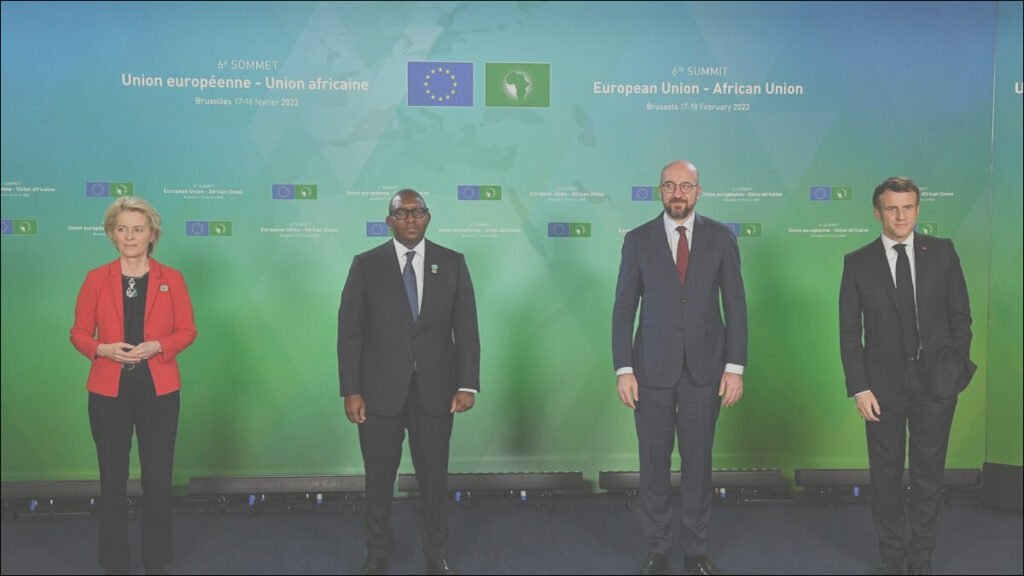The sixth European Union/Africa Union Summit in Brussels. From left to right:
Ursula von der Leyen, President of the European Commission, Jean-Michel Sama Lukonde, Prime Minister of the Democratic Republic of Congo; Charles Michel, President of the European Council, and Emmanuel Macron, President of France.
For an extensive stretch, Africa-Europe relations have been ensconced in the narrative of dependence and aid, painting the continent as needing assistance rather than showcasing its dynamism. Africa, home to a staggering 1.5 billion souls and renowned as a cradle of youthful vigor and burgeoning middle-class prosperity, often feels like a muted player in the global arena.
Yet, the winds of change are stirring, especially concerning the intricate relationships between Africa, China, Russia, the United States, and the European Union (EU)—a shift signaling a reconfiguration of alliances.
In a span of just two decades, China has emerged as a formidable economic force in Africa, capturing attention not only from Europe but the entire globe. Tapping into Africa’s treasure trove of mineral wealth, this behemoth seems to have gained an upper hand in the race for economic partnerships.
While the US has countered with its Lobito Corridor initiative, freshly announced in October 2023 as a strategy to solidify African ties, China has swiftly expanded its foothold by wiping out tariffs on goods from the least-developed nations maintaining ties with Beijing—a move benefiting 33 African countries.
Since the dawn of the Belt and Road Initiative (BRI) in 2013, a colossal intercontinental development blueprint, Chinese investments in Africa have skyrocketed. The surge in Foreign Direct Investment (FDI) reached a remarkable USD 5 billion by 2021, with major injections directed towards nations such as South Africa, Niger, the Democratic Republic of Congo, Egypt, and Cote d’Ivoire in 2022.
This milieu has cultivated a maze of international relations, where Western powers display a palpable unease at Africa’s burgeoning array of partnerships. Europe, in particular, finds itself grappling with Russia’s expanding influence within the continent. As the largest arms supplier to Africa, Russia’s military presence grows alongside its cooperative endeavors with 43 African nations, raising eyebrows in Western circles.
Moreover, the ominous rise of the Wagner Group, a shadowy mercenary force tied closely to Moscow’s political elites, deepens Europe’s anxieties.
Historically, the US and Europe have fancied themselves as the central architects of Africa’s international engagements. The continent’s vast resources and economic promise have undeniably drawn significant interest, igniting debates about the true nature of global partnerships. Skepticism regarding the China-Africa relationship represents a fear of neo-colonialism clashing with a necessity for investment to spur development.
The European Union’s relationship with Africa
In recent times, the European Union has ascended to the role of Africa’s largest trading partner, a premier foreign investor, and a primary development aid provider. This evolving dynamic has morphed into an ambitious cooperation framework identified as the Africa-Europe partnership under the EU’s Global Gateway Strategy, proclaimed in December 2021 by Ursula von der Leyen. It aims to foster more resilient global connections, placing Africa at the epicenter of a transformative vision.
While the Global Gateway initiative does not explicitly reference China, it is widely interpreted as a direct response to the Belt and Road Initiative. Observers note that of the planned 300 billion euros earmarked by the EU, a substantial 150 billion is projected for infrastructure developments across Africa.
What’s in it for the EU?
The EU’s Global Gateway does not flourish within a vacuum. Revisions such as the African Union’s Agenda 2063 and initiatives like the African Continental Free Trade Area have undoubtedly garnered global recognition. Furthermore, Africa’s ascent into the G20 in September 2023 underscores its significance on the global stage, reinforcing the notion that Europe requires Africa as much as Africa needs Europe.
Success in the Global Gateway Strategy rests upon the EU’s capacity to cultivate trust with African nations. Nigeria, for example, one of the continent’s titans, remains hesitant to sign the Economic Partnership Agreement for West Africa, fearing exploitation and external competition that could jeopardize its local industries. This dilemma poses a constant inquiry in Africa-EU dialogues: “What is Europe’s gain?” and, more crucially, “At what cost to Africa?”
Despite the EU’s self-interest, the core objective of the Global Gateway Initiative is to bridge the expansive digital divide that plagues Africa. This geopolitical contest places Europe in rivalry not just with China but with a host of global contenders, positioning Africa as a critical battleground for influence over resources crucial for Europe’s green energy ambitions, like copper, nickel, lithium, and cobalt.
In a revealing glimpse, documents sourced during a visit by 19 African Union Media Fellows to the European Parliament in June 2024 highlighted that out of 225 flagship EU projects approved for 2023 and 2024, a remarkable 116 are poised for Africa, showcasing the continent’s strategic importance.
Yet, African skepticism persists regarding whether these investments genuinely translate into concrete benefits for local populations. Recent cobalt mining activities in the DRC illustrate this dichotomy: global demand does not equate to improved livelihoods but rather exacerbates conflict over resources. Therefore, while the Global Gateway holds tantalizing prospects for Africa’s economic trajectory, paramount questions arise: how to guard African interests within this new partnership?
The road ahead
The EU’s Global Gateway is a grand ambition that, if realized, could herald a transformative era of collaboration and shared prosperity between Africa and Europe. With 11 of the world’s 20 fastest-growing economies located in Africa, according to the African Development Bank’s macroeconomic report, the region is ripe with potential. Yet, whether this partnership fulfills the “win-win” narrative espoused by Brussels or simply reproduces colonial legacies remains an open chapter, one steeped in both promise and uncertainty.

